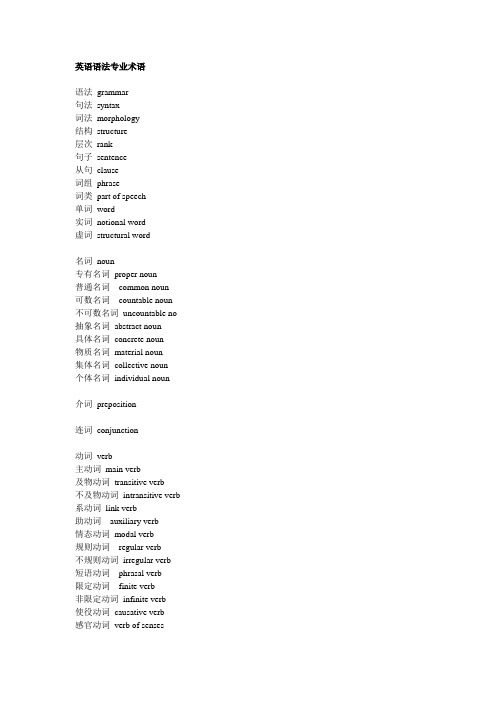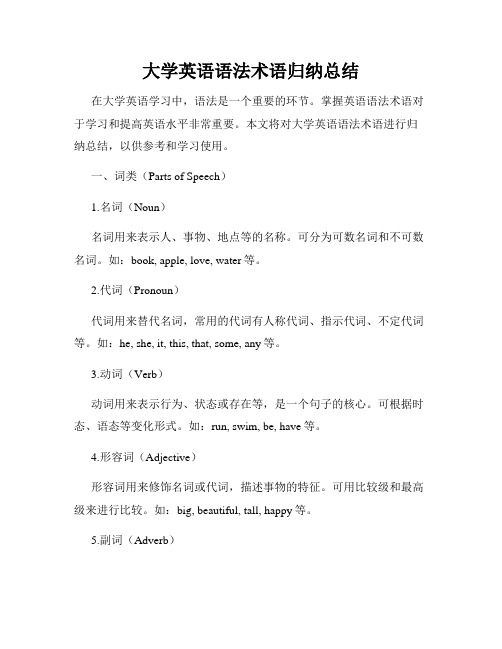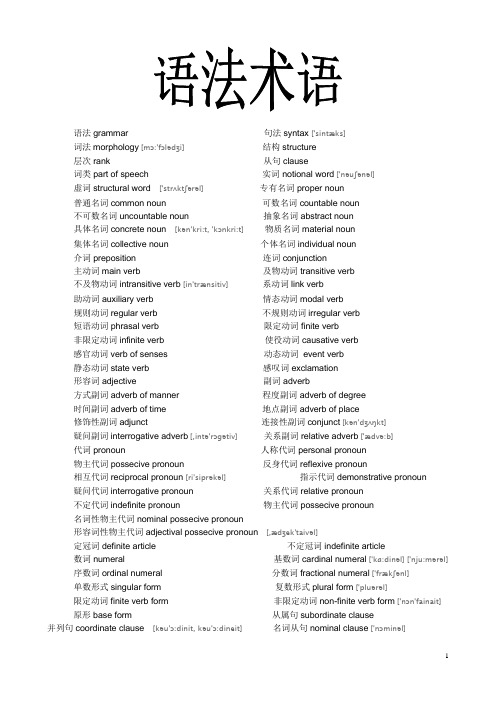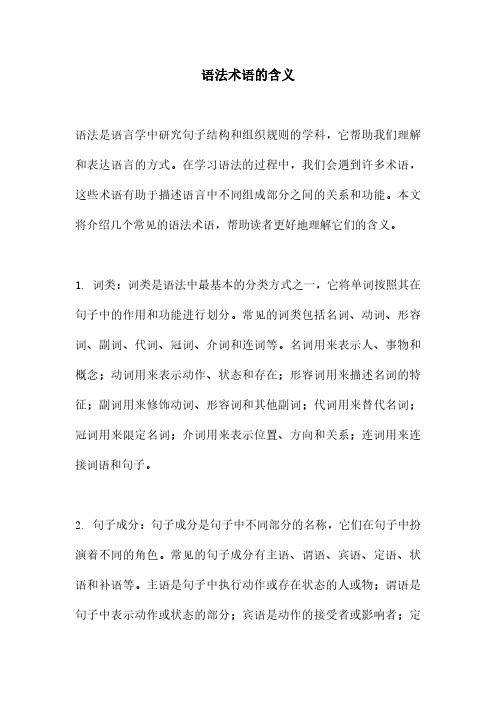语法术语
(完整版)英语语法专业术语

英语语法专业术语语法grammar句法syntax词法morphology结构structure层次rank句子sentence从句clause词组phrase词类part of speech单词word实词notional word虚词structural word名词noun专有名词proper noun普通名词common noun可数名词countable noun 不可数名词uncountable no 抽象名词abstract noun具体名词concrete noun物质名词material noun集体名词collective noun个体名词individual noun介词preposition连词conjunction动词verb主动词main verb及物动词transitive verb不及物动词intransitive verb 系动词link verb助动词auxiliary verb情态动词modal verb规则动词regular verb不规则动词irregular verb 短语动词phrasal verb限定动词finite verb非限定动词infinite verb使役动词causative verb感官动词verb of senses动态动词event verb静态动词state verb感叹词exclamation形容词adjective副词adverb方式副词adverb of manner程度副词adverb of degree时间副词adverb of time地点副词adverb of place修饰性副词adjunct连接性副词conjunct疑问副词interrogative adverb关系副词relative adverb代词pronoun人称代词personal pronoun物主代词possessive pronoun反身代词reflexive pronoun相互代词reciprocal pronoun指示代词demonstrative pronoun疑问代词interrogative pronoun关系代词relative pronoun不定代词indefinite物主代词possessive pronoun名词性物主代词nominal possessive形容词性物主代词adjectival possessive pronoun冠词article定冠词definite article不定冠词indefinite article数词numeral基数词cardinal numeral序数词ordinal numeral分数词fractional numeral形式form单数形式singular form复数形式plural form限定动词finite verb form非限定动词non-finite verb form原形base form从句clause从属句subordinate clause并列句coordinate clause名词从句nominal clause定语从句attributive clause状语从句adverbial clause宾语从句object clause主语从句subject clause同位语从句appositive clause时间状语从句adverbial clause of time地点状语从句adverbial clause of place方式状语从句adverbial clause of manner让步状语从句adverbial clause of concession原因状语从句adverbial clause of cause结果状语从句adverbial clause of result目的状语从句adverbial clause of purpose条件状语从句adverbial clause of condition真实条件状语从句adverbial clause of real condition非真实条件状语从句adverbial clause of unreal condition 含蓄条件句adverbial clause of implied condition错综条件句adverbial clause of mixed condition句子sentence简单句simple sentence并列句compound sentence复合句complex sentence并列复合句compound complex sentence陈述句declarative sentence疑问句interrogative sentence一般疑问句general question特殊疑问句special question选择疑问句alternative question附加疑问句tag question反义疑问句disjunctive question修辞疑问句rhetorical question感叹疑问句exclamatory question存在句existential sentence肯定句positive sentence否定句negative sentence祈使句imperative sentence省略句elliptical sentence感叹句exclamatory sentence基本句型basic sentence pattern句子成分members of sentences 主语subject谓语predicate宾语object双宾语dual object直接宾语direct object间接宾语indirect object复合宾语complex object同源宾语cognate object补语complement主补subject complement宾补object complement表语predicative定语attribute同位语appositive状语adverbial句法关系syntactic relationship 并列coordinate从属subordination修饰modification前置修饰pre-modification后置修饰post-modification限制restriction双重限制double-restriction非限制non-restriction数number单数形式singular form复数形式plural form规则形式regular form不规则形式irregular form格case普通格common case所有格possessive case主格nominative case宾格objective case性gender阳性masculine阴性feminine通性common中性neuter人称person第一人称first person第二人称second person第三人称third person时态tense过去将来时past future tense过去将来进行时past future continuous tense过去将来完成时past future perfect tense一般现在时present simple tense一般过去时past simple tense一般将来时future simple tense现在完成时past perfect tense过去完成时present perfect tense将来完成时future perfect tense现在进行时present continuous tense过去进行时past continuous tense将来进行时future continuous tense过去将来进行时past future continuous tense现在完成进行时present perfect continuous tense 过去完成进行时past perfect continuous tense语态voice主动语态active voice被动语态passive voice语气mood陈述语气indicative mood祈使语气imperative mood虚拟语气subjunctive mood否定negation否定范围scope of negation全部否定full negation局部否定partial negation转移否定shift of negation语序order自然语序natural order倒装语序inversion全部倒装full inversion部分倒装partial inversion直接引语direct speech间接引语indirect speech自由直接引语free direct speech自由间接引语free indirect speech一致agreement主谓一致subject-predicate agreement 语法一致grammatical agreement概念一致notional agreement就近原则principle of proximity强调emphasis重复repetition语音pronunciation语调tone升调rising tone降调falling tone降升调falling-rising tone文体style正式文体formal非正式文体informal口语spoken/oral English套语formulistic expression英国英语British English美国英语American English用法usage感情色彩emotional coloring褒义commendatory贬义derogatory幽默humorous讽刺sarcastic挖苦ironic动名词gerund连字号hyphen祈使语气imperative mood祈使句imperative sentences独立成分indefinite case主句indicative mood物质名词material nouns句子的成分members of the sentence 情态动词modal verbs语气mood词法morphology否定疑问句negative interrogative sentence动词的非限定形式non-finite forms of the verb非限制性定语从句non-restrictive attributive clauses 括号brackets名词的分类classification of nouns从句(分句)clauses同源宾语cognate object集体名词collective nouns冒号colon逗号comma普通格common case普通名词common nouns比较级comparative degree复合宾语complex Object复合句complex sentences并列复合句compound complex sentences表性状的复合谓语compound nominal predicate复合谓语compound predicate并列句compound sentences表行为的复合谓语compound verbal predicate合成词compound words合成compounding ( composition )错综时间条件句conditional sentences of mixed time 连词conjunction连接副词conjunctive adverbs连接代词conjunctive pronouns转化conversion并列连词co-coordinating conjunctions可数名词countable nouns破折号dash陈述句declarative sentences定冠词definite article比较的级别degrees of comparison指示代词demonstrative pronouns派生(词缀法)derivation ( affixation )描绘性定语descriptive attributes呼语direct address直接宾语direct object直接引语direct speech反意问句disjunctive questions省略ellipsis省略句elliptical sentences感叹号exclamation mark感叹句exclamatory sentences动词的限定形式finite forms of the verb虚词form words分数词fractional numerals完全倒装full inversion将来进行时future continuous一般将来时future indefinite将来完成时future perfect将来完成进行时future perfect continuous独立结构absolute constructions物主代词的绝对形式absolute forms of possessive pronouns 抽象名词abstract nouns主动语态active voice方式状语从句adverbial clauses of manner地点状语从句adverbial clauses of place目的状语从句adverbial clauses of purpose时间状语从句adverbial clauses of time程度副词adverbs of degree频度副词adverbs of frequency方式副词adverbs of manner地点副词adverbs of place时间副词adverbs of time选择问句alternative questions句子分析analysis of sentences省略号apostrophe同谓语appositive同位语从句appositive clauses助动词auxiliary verbs插入语parenthesis部分倒装partial inversion分词短语participial phrases分词participle小品词particle词类parts of speech过去式past forms过去分词past participle句号period ( full stop )人称person人称代词personal pronouns成语动词phrasal verbs谓语predicate表语predicative表语从句predicative clauses前缀prefix(es)介词短语prepositional phrases现在式present forms现在分词present participle动词的主要形式principal forms of verbs专有名词proper nouns标点符号punctuation问号question mark引号quotation mark相互代词reciprocal pronouns不定代词indefinite Pronouns关系副词relative adverbs关系代词relative pronouns限制性定语从句restrictive attributive clauses 自身代词self pronouns分号semicolon真实条件句sentences of real condition虚拟条件句sentences of unreal condition时态的呼应sequence of tenses特殊问句special questions虚拟语气subjunctive mood后缀suffix(es)最高级superlative degree句法syntax句型的转换transformation of sentences双部句two-member sentences不可数名词uncountable nouns动词短语verbal phrases名词化的动词verbal noun构词法word building。
大学英语语法术语归纳总结

大学英语语法术语归纳总结在大学英语学习中,语法是一个重要的环节。
掌握英语语法术语对于学习和提高英语水平非常重要。
本文将对大学英语语法术语进行归纳总结,以供参考和学习使用。
一、词类(Parts of Speech)1.名词(Noun)名词用来表示人、事物、地点等的名称。
可分为可数名词和不可数名词。
如:book, apple, love, water等。
2.代词(Pronoun)代词用来替代名词,常用的代词有人称代词、指示代词、不定代词等。
如:he, she, it, this, that, some, any等。
3.动词(Verb)动词用来表示行为、状态或存在等,是一个句子的核心。
可根据时态、语态等变化形式。
如:run, swim, be, have等。
4.形容词(Adjective)形容词用来修饰名词或代词,描述事物的特征。
可用比较级和最高级来进行比较。
如:big, beautiful, tall, happy等。
5.副词(Adverb)副词用来修饰动词、形容词、其他副词等,用于描述行为方式、程度、时间等。
如:quickly, very, soon, often等。
6.介词(Preposition)介词用来表达位置、方向、时间、原因等关系,常与名词或代词搭配使用。
如:in, on, at, for, with等。
7.连词(Conjunction)连词用来连接词语、短语、从句等,使句子结构更加完整。
如:and, but, or, because等。
8.感叹词(Interjection)感叹词用来表达强烈的情感或意见,常用于口语交流中。
如:oh, wow, yes, no等。
二、句子成分(Sentence Elements)1.主语(Subject)主语是一个句子中的核心,通常是一个名词或代词。
如:I, he, the dog, my sister等。
2.谓语(Predicate)谓语是一个句子中的动词或动词短语,用来描述主语的动作或状态。
语法术语 全面归纳

定语从句attributive clause [ə'tribjutiv] 状语从句adverbial clause 宾语从句object clause 主语从句subject clause 同位语从句appositive clause 时间状语从句adverbial clause of time 地点状语从句adverbial clause of place 方式状语从句adverbial clause of manner 让步状语从句adverbial clause of concession 原因状语从句adverbial clause of cause 结果状语从句adverbial clause of result 目的状语从句adverbial clause of purpose 条件状语从句adverbial clause of condition真实条件状语从句adverbial clause of real condition非真实条件状语从句adverbial clause of unreal condition含蓄条件句adverbial clause of implied condition错综条件句adverbial clause of mixed condition简单句simple sentence 并列句compound sentence复合句complex sentence 并列复合句compound complex sentence 陈述句declarative sentence 疑问句interrogative sentence一般疑问句general question 特殊疑问句special question选择疑问句alternative question 附加疑问句tag question反义疑问句disjunctive question 修辞疑问句rhetorical question[ri'tɔrikəl, -'tɔ:-]感叹疑问句exclamatory question 存在句existential sentence[,eɡzis'tenʃəl]肯定句positive sentence 否定句negative sentence祈使句imperative sentence 省略句elliptical sentence[i'liptik,-kəl]感叹句exclamatory sentence[ik'sklæmətəri]基本句型basic sentence pattern句子成分主语subject 谓语predicate['predikeit] 宾语object 双宾语dual object ['dju:əl] 直接宾语direct object 间接宾语indirect object 复合宾语complex object 同源宾语cognate object ['kɔɡneit]补语主补subject complement 宾补object complement 表语predicative 定语attribute 同位语appositive 状语adverbial 句法关系syntactic relationship并列coordinate 从属,主从关系subordination[sə,bɔ:di'neiʃən] 修饰modification 前置修饰pre-modification 后置修饰post-modification 限制restriction双重限制double-restriction 非限制non-restriction格case通格common case 所有格possecive case主格nominative case ['nɔminətiv, -nei-] 宾格objective case性gender ['dʒendə]阴性masculine['mæskjulin] 阳性feminine['feminin] 通性common 中性neuter['nju:tə]人称person第一人称first person 第二人称second person 第三人称third person时态tense过去将来时past future tense 过去将来进行时past future continuous tense过去将来完成时past future perfect tense 一般现在时present simple tense一般过去时past simple tense 一般将来时future simple tense现在完成时past perfect tense 过去完成时present perfect tense 将来完成时future perfect tense 现在进行时present continuous tense 过去进行时past continuous tense 将来进行时future continuous tense过去将来进行时past future continuous tense 现在完成进行时present perfect continuous tense 过去完成进行时past perfect continuous tense语态voice主动语态active voice 被动语态passive voice['pæsiv]语气mood陈述语气indicative mood祈使语气imperative mood虚拟语气subjunctive mood否定negation[ni'ɡeiʃən] 全部否定full negation[ni'ɡeiʃən]局部否定partial negation 转移否定shift of negation自然语序natural order 倒装语序inversion全部倒装full inversion[in'və:ʃən]部分倒装partial inversion[in'və:ʃən]直接引语direct speech 间接引语indirect speech自由直接引语free direct speech自由间接引语free indirect speech主谓一致subject-predicate agreement 语法一致grammatical agreement[ɡrə'mætikəl]概念一致notional agreement 就近原则principle of proximity[prɔk'simiti]强调emphasis 重复repetition语音pronunciation 语调tone[təun]升调rising tone 降调falling tone降升调falling-rising tone 文体style套语formulistic expression ['fɔ:mjulistik]用法usage['ju:zidʒ]感情色彩emotional coloring褒义commendatory [kɔ'mendətəri] 贬义的derogatory[di'rɔɡətəri]幽默humorous 挖苦的,尖刻的sarcastic[sɑ:'kæztik]讽刺的,反语的ironic [ai'rɔnik,-kəl]。
语法术语中英文

语法术语中英文1. Noun (名词)countable uncountable (可数名词、不可数名词)Number of N (名词的数)Irregular plurals (不规那么复数)Genitive case of N (名词的所有格)Double genitive (双重所有格)2.Pronoun (代词)Personal pronoun (人称代词)Possessive pronoun (物主代词)Reflexive pronoun (反身代词)Interrogative pronoun (疑问代词)Indefinite pronoun (不定代词)3.Numeral (数次)Cardinal 、ordinal numbers (基数词、序数词)Percentage (百分数)Fraction (分数)Decimal (小数)Multiple (倍数)4.Determiner (限定词)Definite, indefinite, zero articles (定冠词,不定冠词,零冠词)Quantifiers (数量词)5.Preposition (介词)6.Adjective (形容词)Attributive 定语Predicative 表语Adverb clause equivalent 副词性从句7. Adverb (副词)Modifier of Adj / Adv / Prep-phrase / N-Phrase / Adverb-clause (形容词、副词、介词短语、副词性从句的修饰语)The comparative and superlative degrees of Adj / Adv (形容词和副词的比较级和最高级)9. Verb classes (动词)Transitive and intransitive verbs(及物动词和不及物动词)Auxiliaries and modal auxiliaries(助动词和情态动词)Semi-auxiliaries (半助动词)Phrasal verbs (短语动词)10. Tense (时态)Simple present, past, future and with modals (一样此刻时,一样过去时,一样以后时和情态助动词加动词)Present and past progressive(此刻进行时和过去进行时)Future progressive and with modals(以后进行时和情态动词加进行时)Present and past perfect(此刻完成时和过去完成时)Future perfect and with modals (以后完成时和情态动词加完成时)Present perfect progressive(此刻完成进行时)Past perfect progressive (过去完成进行时)voice (被动语态)Passive voice in simple tense(被动语态的一样时态)Passive voice in perfect and progressive tenses (被动语态的完成和进行时态)Passive voice of phrasal verbs (短语动词的被动语态)12.Subjunctive mood (虚拟语气)13.To V (Infinitive 动词不定式)as subject, object and complement (用作主语,宾语和补足语)Indicating purpose / result (表示目的和结果)Modifying adjective (修饰形容词)as post modifier in a noun phrase (后位修饰名词)to be + V-ed2, to have + V-ed2, to be + V-ing (不定式的被动式,完成式和进行式)14.V-ing (Gerund 动名词)object, subject and predicative (宾语, 主语和表语)N / Pronouns or their possessive + V-ing as subject and object (名词/ 代词或其所有格加动名词作主语和宾语)Prep + N / Pronouns or their possessive + V-ing (介词加名词/代词或其所有格加动名词)being + V-ed2, having + V-ed2, having been + V-ed2 as a noun equivale nt (动名词的被动式,完成式和完成被动式起名词作用)15pre-modifier and post modifier in a noun phrase 此刻分词和过去分词)as complement (补足语)as an adverb clause equivalen t(作状语)When / while, etc. + V-ing / V-ed2 (When / While 等加此刻分词或过去分词)(with) N + V-ing / V-ed2 ( [ with ] 名词加此刻分词或过去分词)Dangling V-ing as adverb clause equivalen t(无归属此刻分词作状语)being + V-ed2, having + V-ed2, having been + V-ed2 as an adverb or adjective clause equivalen t(此刻分词的被动式、完成式和完成被动式作状语或定语)16. Basic sentence patterns and sentence elements (大体句型和句子成份)Pattern 1: S + VPattern 2: S + V + CsPattern 3: S + V + OPattern 4: S + V + Oi + OdPattern 5: S + V + Od + Co17. Interrogative form (疑问形式)Negative form (否定形式)Passive form (被动形式)relative clause (定语从句)Restrictive and non-restrictive (限制Pare nt hesis (插入语)Omission (省略)Omission through coordination (并列结构中的省略)Negation (否定)Total negation (全数否定)Partial negation (部份否定)Double negation (双重否定)Transferred negation (转移否定)性和非限制性定语从句)Appositive clause (同位语从句)Noun phrase appositive to clause(名词短语作句子的同位语)Clause of time and space(时刻从句和地址从句)Clauses of condition, concession and con tras t (条件从句、妥协从句和对照从句)Clauses of cause, result and purpose(缘故从句、结果从句和目的从句)Clauses of manner and comparison(方式从句和比较从句)Clauses of proportion and other types(比例从句和其它从句)3rd person pronouns, and plurals of the 1st and 2nd person pronouns (第三人称代词,第一、二人称代词的复数)indefinite pronouns (不定代词)(+ of + N / Pron)Subjec t-verb inversion(主语与谓语倒装)朗文高级英语语法》第一章动词时态概述(Overview Of Verb Tenses)1- 1 一样时态(The Simple Tenses)1- 2 进行时态(The ProgressiveTenses)31- 3 完成时态(The Perfect Tenses)1- 4 完成进行时态(The PerfectProgressive Tenses)1-5 时态用法总结(Summary Chart ofVerb Tenses)1- 6 -ing 和-ed 形式的拼写(Spelling of -ing and -ed Forms)第二章一样此刻时,一样过去时,此刻进行时和过去进行时(Present And Past,Simple And Progressive)2- 1 一样此刻时(Simple Present) 2- 2 此刻进行时(Present Progressive)2- 3 静态动词( Stative Verbs)2-5 规那么动词和不规那么动词(Regular and Irregular Verbs)2-6 规那么动词:-ed的发音(RegularVerbs: Pronunciation of -ed Endings)2-7 不规那么动词表(Irregular Verbs: an Alphabetical List)2-8 易混淆的动词:raise/rise, set/sit, lay/lie (Troublesome Verbs: raise/rise, set/sit, lay/lie)2-9 一样过去时(Simple Past)2-10 过去进行时(Past Progressive)2-11进行时态与always连用表示抱怨(Using Progressive Verbs with always to Complain)2-12 进行时态中地址状语的用法(Using Expressions of Place with Progressive Verbs) being + Adjective)3- 1 此刻完成时(Present Perfect)2-4 am/is/are being+形容词(am/is/are第三章完成时和完成进行时(Perfect And Perfect Progressive Tenses)3- 2 此刻完成进行时(Present Perfect Progressive) 3- 3 过去完成时(Past Perfect)3- 4 过去完成进行时(Past Perfect Progressive)第四章以后时(Future Time)4- 1 一样以后时:will 和be going to (Simple Future: will and be going to)4- 2 will 与be going to 的比较(will vs. be going to)4- 3 历时刻状语从句表示以后(Expressing the Future in Time Clauses)4-4 用一样此刻时和此刻进行时表示以后(Using the Present Progressive and the Simple Present to Express Future Time)4- 5 以后进行时(Future Progressive)4- 6 以后完成时(Future Perfect)4-7 以后完成进行时(Future Perfect Progressive)第五章时刻状语从句和时态的温习(Adverb Clauses Of Time And Review Of Verb Tenses)5- 1 时刻状语从句:形式(Adverb Clauses of Time: Form)5- 2 历时刻状语从句表示时刻关系(Using Adverb Clauses to Show Time Relationships)第六章主谓一致(Subject-verbAgreement)6-1以-s或-es结尾的词:用法、发音和拼写(Final -s/-es: Use, Pronunciation, and Spelling)6-2 大体的主谓一致问题(BasicSubject-verb Agreement)6-3 主谓一致:表达数量(Subject-verb Agreement: Using Expressions of Quantity)6-4 主谓一致:there be的用法(Subject-verb Agreement: Using there + be)6- 5 主谓一致:不规那么用法(Subject-verb Agreement: Some Irregularities)第七章名词(Nouns)7- 1 名词复数形式的规那么和不规那么转变(Regular and Irregular Plural Nouns)7- 2 所有格(Possessive Nouns)1037- 3 名词作修饰语(Using Nouns as Modifiers)7-4 可数名词和不可数名词(Count andNoncount Nouns)7- 5 不可数名词(Noncount Nouns)7- 6 常见不可数名词(Some Common Noncount Nouns)7-7 冠词的大体用法(Basic ArticleUsage)7-8 冠词用法的大体原那么(General Guidelines for Article Usage)7-9 数量的表达(Expressions of Quantity)7-10 a few 和few, a little 和little 的用法(Using a few and few; a little and little)7-11 带of 的数量表达(Using of in Expressions of Quantity)7-12 all (of)和both (of)〔All (of) and both (of) 7-13 单数的数量表达:one, each, every (Singular Expressions of Quantity: one, each, every)第八章代词(Pronouns)8- 1 人称代词(Personal Pronouns)8- 2 人称代词:与类属名词、不定代词的一致性(Personal Pronouns: Agreement with Generic Nouns and Indefinite Pronouns)8-3 人称代词:与集合名词的一致性(Personal Pronouns: Agreement with Collective Nouns)8- 4 反身代词(Reflexive Pronouns)8-5 you, one 和they 用作非人称代词(Using you, one, and they as Impersonal Pronouns)8- 6 other 的形式(Forms of other)8-7 other 的常见表达(CommonExpressions with other)第九章情态动词(一) (Modals, Part 1)9- 1 概述(Introduction)9-2 I作主语的礼貌请求(PoliteQuestions with I as the Subject)9-3 you 作主语的礼貌请求(PoliteQuestions with you as the Subject)9- 4 would you mind 用作礼貌请求(Polite Requests with would you mind)9- 5 表示必需:must, have to, have got to (Expressing Necessity: must, have to, have got to)9-6 没必要要和禁止:have to和must的否定形式(Lack of Necessity and Prohibition: have to and must in the Negative)9-7 忠告:should, ought to, had better (Advisability: should, ought to, had better)9-8 should 的过去式(The Past Form of should)9-9 期望:be supposed to (Expec tatio ns: be supposed to)9-10 提议:let's, why don't, shall I/we(Making Suggestions: let's, why don't, shall I/we)9-11 提议:could与should的比较(Making Suggestions: could vs. should) 第十章情态动词(二) (Modals, Part 2)10- 1 表示确信程度:此刻时(Degrees of Certainty: Present Time)10-2 表示确信程度:此刻时的否定形式(Degrees of Certainty: Present Time Negative)10-3 表示确信程度:过去时(Degrees of Certainty: Past Time)10-4 表示确信程度:以后时(Degrees of Certainty: Future Time)10-5 情态动词的进行式(Progressive Forms of Modals)10-6 表示能力:can 和could (Ability:can and could)10-7 would 表示过去重复性的动作(Using would to Express a RepeatedAction in the Past)10-8 表示偏向: would rather(Expressing Preference: would rather)10-9 情态动词和短语情态动词的结合(Combining Modals with Phrasal Modals)10-10 情态动词和类似表达的总结表(Summary Chart of Modals and Similar Expressions)第十一章被动语态(The Passive)11-1 被动语态的组成(Forming the Passive)11-2 被动语态的用法(Using thePassive)11-3 间接宾语用作被动语态的主语(Indirect Objects Used as Passive Subjects)11-4 情态动词与短语情态动词的被动语态(The Passive Form of Modals and Phrasal Modals)11-5 静态被动语态(Stative Passive)11-6 常见静态被动语态动词 + 介词(Common Stative Passive Verbs + Prepositions)11-7 get 与被动语态(The Passive with get) 11-8 分词形容词(Participial Adjectives)第十二章名词性从句(Noun Clauses)12-1 概述(Introduction)12-2 以疑问词开头的名词性从句(Noun Clauses Beginning with a Question Word)12-3以whether或if开头的名词性从句(Noun Clauses Beginning with whether or if)12-4疑问词后接不定式(Ques tion Words Followed by Infinitives)12-5 以that 开头的名词性从句(NounClauses Beginning with that)12-6 直接引语(Quoted Speech)12-7 间接引语:名词性从句中动词的形式(Reported Speech: Verb Forms in Noun Clauses)12-8 名词性从句中虚拟语气的用法(Using the Subjunctive in Noun Clauses)12-9 带有-ever的辞汇的用法(Using -ever Words)第十三章定语从句(Adjective Clauses)13- 1 概述(Introduction)13-2 定语从句的关系代词作主语(Adjective Clause Pronouns Used as the Subject)13-3 定语从句的关系代词作动词的宾语(Adjective Clause Pronouns Used as the Object of a Verb)13-4 定语从句的关系代词作介词的宾语(Adjective Clause Pronouns Used as the Object of a Preposition)13-5 定语从句的经常使用句型(UsualPatterns of Adjective Clauses)13-6 whose 的用法(Using whose)13-7定语从句中where的用法(Using where in Adjective Clauses)13-8 定语从句中when的用法(Using when in Adjective Clauses)13-9 定语从句修饰代词的用法(Using Adjective Clauses to Modify Pronouns)13-10 定语从句中标点符号的利用(Punctuating Adjective Clauses) 13-11 定语从句中数量的表示方式(Using Expressions of Quantity in Adjective Clauses)13-12 名词+of which 的用法(U sing Noun + of which)28613-13 which修饰整个句子的用法(Using which to Modify a Whole Sentence)28613-14 将定语从句简化为形容词短语:概述(Reducing Adjective Clauses to Adjective Phrases: Introduction)13-15 将定语从句转变成形容词短语(Changing an Adjective Clause to an Adjective Phrase)第十四章动名词和不定式(一) (GerundsAnd Infinitives, Part 1)14- 1 动名词:概述(Gerunds: Introduction)14-2 动名词作介词的宾语(Using Gerunds as the Objects of Prepositions)14-3 后面接动名词的常见介词短语(Common Preposition CombinationsFollowed by Gerunds)14-4 后面接动名词的常见动词(CommonVerbs Followed by Gerunds)14-5 go+动名词(go + Gerund)14-6后面接动词-ing形式的固定搭配(Special Expressions Followed by -ing)14-7 后面接不定式的常见动词(CommonVerbs Followed by Infinitives)14-8 后面既可接不定式又可接动名词的常见动词(Common Verbs Followed by either Infinitives or Gerunds)14-9 后面接动名词的动词列表(Reference List of Verbs Followed byGerunds) 14-10 后面接不定式的动词列表(Reference List of Verbs Followed by Infinitives)14-11 it +不定式;动名词和不定式作主语(it + Infinitive; Gerunds and Infinitives as Subjects) And Infinitives, Part 2)15-1 表示目的的不定式:in order to (Infinitive of Purpose: in order to)15-2 后面接不定式的形容词(Adjectives Followed by Infinitives)15-3 不定式与too和enough连用(Using Infinitives with too and enough)15-4 不定式和动名词的被动语态和完成式(Passive and Past Forms of Infinitives and Gerunds)15-5 need 后接动名词或不定式的被动语态形式(Using Gerunds or Passive Infinitives Following need)15-6 所有格修饰动名词(Using a Possessive to Modify a Gerund)15-7 感官动词的用法(Using Verbs of Perception)15-8 let和help后接动词原形(Using the Simple Form after let and help)15-9 使役动词的用法:make, have, get(Using Causative Verbs: make, have, get)第十五章动名词和不定式(二) (Gerunds第十六章并列连词(Coordinating16-1 平行结构(Parallel Structure)16-2 成对连词:both・・・and; not only… but also; either … or; neither … nor (Using Paired Conjunctions: both . . . and; not only . . . but also; either . . . or; neither . . . nor)16- 3 用并列连词连接独立分句(Combining Independent Clauses with Coordinating Conjunctions)第十七章状语从句(Adverb Clauses)17- 1 概述(In troduc tion)17-2 缘故状语从句(Using Adverb Clauses to Show Cause and Effect)17-3表达对照(意外的结果):even though 的用法〔Expressing Contrast (Unexpected Result): Using even though〕17-4 表达直接对照:while和whereas (Showing Direct Contrast: while and whereas)17-5条件状语从句:if从句(Expressing Conditions in Adverb Clauses: 17-6 条件状语从句:whether or not和even if 的用法(Adverb Clauses of Condition: Using whether or not and even if)17-7 条件状语从句:in case和in the event that 的用法(Adverb Clauses of Condition: Using in case and in the event that)17-8 条件状语从句:unless的用法(Adverb Clauses of Condition: Using unless)17-9 条件状语从句:only if的用法(Adverb Clauses of Condition: Using only if)第十八章将状语从句简化为修饰性的副词短语(Reduction Of Adverb Clauses To Modifying Adverbial Phrases)18- 1 概述(In troduc tion)18-2 将时刻状语从句简化为修饰性的副词短语(Changing Time Clauses to Modifying Adverbial Phrases)18-3 用修饰性的副词短语表达“与此同时”的概念(Expressing the Idea of “During the Same Time” in Modifying Adverbial Phrases)18-4 用修饰性的副词短语表示因果关系(Expressing Cause and Effect in Modifying Adverbial Phrases)18-5 在修饰性的副词短语中利用“upon + -ing” (Using upon + -ing in Modifying Adverbial Phrases)第十九章表示因果、对照和条件关系的关联词(Connectives That Express Cause And Effect, Contrast, And Condition)19-1 because of 和due to 的用法(Using because of and due to)19-2用过渡词表示因果关系:therefore 和consequently (Using Transitions to Show Cause and Effect: therefore and consequently)19-3 句型和标点符号小结(Summary ofPatterns and Punctuation)19-4其它表示因果关系的方式:such… that 和so …that (Other Ways of Expressing Cause and Effect: such . . . that and so . . . that)19-5 表示目的:so that的用法(Expressing Purpose: Using so that)19-6 表示对照(意料之外的结果) 〔Showing Contrast (Unexpected Result)〕19-7 表示直接对照(Showing Direct Contrast)19-8 表示条件:otherwise 和or (else) 的用法〔Expressing Conditions: Using otherwise and or (else)〕19-9 关联词小结:因果、对照和条件关系(Summary of Connectives: Cause and Effect, Contrast, Condition)第二十章条件句和表达愿望的方式(Conditional Sentences And Wishes)20- 1 条件句中一样动词形式概述(Overview of Basic Verb Forms Used in Conditional Sentences)20-2 此刻和以后的真实条件句(True in the Present or Future)20-3 此刻和以后的非真实条件句(与事实相反)〔Untrue (Contrary to Fact) in the Present or Future〕20-4 过去的非真实条件句 (与事实相反) 〔Untrue (Contrary to Fact) in the Past〕20-5 在条件句中利用动词的进行时形式(Using Progressive Verb Forms in Conditional Sentences)20-6条件句中“混合时刻”的用法(Using“ Mixed Time ” in ConditionalSentences)42420-7 if 的省略(Omitting if)20-8 暗含的条件(Implied Cond it ions)20-9 as if / as though 的用法(Using as if/as though) 20-10 wish后面的动词形式(Verb Forms Following wish)20-11 用would 表达关于以后的希望(Using would to Make Wishes about the Future)434and Objects)A-2 介词和介词短语(Prepositions and Prepositional Phrases) A-3 形容词(Adjectives)A-4 副词(Adverbs)A-5 be 动词(The Verb be)A-6 系动词(Linking Verbs)B单元:疑问句(Questions)B-1 一样疑问句和特殊疑问句的形式(Forms of Yes/No and Information Questions)B-2 疑问词(Ques tion Words)B-3 简化的一样疑问句(Shortened Yes/No Questions)B-4 否定疑问句(Negative Questions) B-5 反意疑问句(Tag Questions)附录增补语法单元(Supplementary Grammar Units)A 单元:大体语法术语(Basic GrammarTerminology)C 单元:缩写(Contractions) D单元:否定句(Negatives)D-1 not与其它否定词的用法(Using not and Other Negative Words)A-1 主语、动词和宾语(Subjects, Verbs,D-2 幸免“重复两次否定” (Avoiding Double Negatives)D-3 以否定词开头的句子(Beginning a Sentence with a Negative Word)E 单元:介词搭配(Preposition Combinations)E 形容词和动词的介词搭配(Preposition Combinations withAdjectives and Verbs)F 单元:用来举例和延续观点的关联词(Connectives To Give Examples And To Continue An Idea)F-1 用来举例的关联词(Connectives to Give Examples)F-2 用来延续观点的关联词(Connectives to Continue the Same Idea)G 单元:动词形式的回忆练习(Verb Form Review Exercises)。
语法术语的含义

语法术语的含义语法是语言学中研究句子结构和组织规则的学科,它帮助我们理解和表达语言的方式。
在学习语法的过程中,我们会遇到许多术语,这些术语有助于描述语言中不同组成部分之间的关系和功能。
本文将介绍几个常见的语法术语,帮助读者更好地理解它们的含义。
1.词类:词类是语法中最基本的分类方式之一,它将单词按照其在句子中的作用和功能进行划分。
常见的词类包括名词、动词、形容词、副词、代词、冠词、介词和连词等。
名词用来表示人、事物和概念;动词用来表示动作、状态和存在;形容词用来描述名词的特征;副词用来修饰动词、形容词和其他副词;代词用来替代名词;冠词用来限定名词;介词用来表示位置、方向和关系;连词用来连接词语和句子。
2.句子成分:句子成分是句子中不同部分的名称,它们在句子中扮演着不同的角色。
常见的句子成分有主语、谓语、宾语、定语、状语和补语等。
主语是句子中执行动作或存在状态的人或物;谓语是句子中表示动作或状态的部分;宾语是动作的接受者或影响者;定语用来修饰名词或代词;状语用来修饰动词、形容词和副词;补语用来补充和完善句子的意义。
3.时态:时态用来表示动作发生的时间。
常见的时态有一般现在时、一般过去时、一般将来时等。
一般现在时表示现在经常或普遍发生的动作;一般过去时表示过去发生的动作或存在的状态;一般将来时表示将来要发生的动作或存在的状态。
4.语态:语态用来表示句子的主语是动作的执行者还是受事者。
常见的语态有主动语态和被动语态。
主动语态表示主语执行动作;被动语态表示主语接受动作。
5.句式:句式是句子的结构模式,它描述了不同句子成分之间的关系和排列方式。
常见的句式包括简单句、并列句、复合句和复合并列句等。
简单句由一个主谓结构组成;并列句由两个或多个独立的句子通过连词连接;复合句包含一个主句和一个或多个从句;复合并列句则是并列句和复合句的结合。
通过学习这些语法术语,我们能够更准确地理解和运用语言。
它们帮助我们分析句子结构、理解句子意义,甚至提高我们的写作和表达能力。
英语语法术语大全

英语语法术语大全以下是一些常见的英语语法术语大全:1. Noun(名词):表示人、事物、地方或抽象概念的词。
2. Pronoun(代词):用来替代名词的词。
3. Verb(动词):表示动作、状态或存在的词。
4. Adjective(形容词):修饰名词或代词,描述其性质或特征的词。
5. Adverb(副词):修饰动词、形容词或其他副词,表示时间、地点、程度、方式等的词。
6. Preposition(介词):用于表示名词与其他词之间的关系的词。
7. Conjunction(连词):连接词与词、短语与短语、句子与句子的词。
8. Article(冠词):用于限定名词的词,包括定冠词(the)和不定冠词(a/an)。
9. Determiner(限定词):用于限定名词或确定名词所指的词,如this, that, these, those等。
10. Subject(主语):句子中执行动作或被描述的名词或代词。
11. Predicate(谓语):句子中描述主语的动词或动词短语。
12. Object(宾语):接受动作的名词或代词。
13. Direct Object(直接宾语):直接接受动作的名词或代词。
14. Indirect Object(间接宾语):表示间接受益者或接收者的名词或代词。
15. Clause(从句):包含主语和谓语的句子部分。
16. Phrase(短语):由词组成的没有主谓关系的句子部分。
17. Compound Sentence(并列句):由两个或多个独立的句子通过连词连接起来。
18. Complex Sentence(复合句):包含一个主句和一个或多个从句的句子。
19. Passive Voice(被动语态):表达动作的承受者在句子中作为主语的结构。
20. Active Voice(主动语态):表达动作执行者在句子中作为主语的结构。
这里只是列举了一些常见的英语语法术语,还有许多其他的术语可以在学习英语语法过程中逐渐了解和掌握。
语法术语
词 word词素 morpheme自由词素 free morpheme粘附词素 bound morpheme简单词 simple word , morpheme word(单词素词)词根 root派生词 derivative屈折词缀 inflectional affix派生词缀 derivational affix前缀 prefix后缀 suffix 粘附词根 bound root词素变体 allomorph原始派生词 primitive derivative复合词 compound word compounding form新古典复合词 neo-classical compound复合连词 compound conjunction封闭词类 closed class开放词类 open class功能词 function word实义词 content word调核 nucleus(语调核心,是一个调组中显示音调抑扬变化(降、升、降升ˇ或升降^)的强重读音节。
与调组中其它音节相对而言,调核的音调最高,音幅最阔,动态变化最大,因而是语流中听觉效果最显著的音段。
一个调组可以没有调冠、调头或调尾,但不能没有调核。
分析性语言 analytic language强调词 emphasizer并列连词 coordinator近似并列连词 quasi-coordinator从属连词 subordinator简单从属连词 simple subordinator即单词从属连词 one-word subordinator复杂从属连词 complex subordinator 关联从属连词 correlative subordinator 边际从属连词 marginal subordinator关系词 relative word副词性指代词 coreference pro-form句子成分 members of sentences主语 subject实义主语 notional subject真主语 real subject谓语 predicate宾语 object双宾语 dual object直接宾语 direct object 间接宾语 indirect object 复合宾语 complex object 同源宾语 cognate object 补语 complement主补 subject complement 宾补 object complement 表语 predicative定语 attribute同位语 appositive状语 adverbial补足成分 complementation (如宾语,补语,状语等)并列谓语 compound predicate双重谓语 double predicate操作词 operator述谓成分 predication动词 verb主动词 main verb及物动词 transitive verb不及物动词 intransitive verb连系动词 linking verb助动词 auxiliary verb基本助动词 primary auxiliary 情态助动词 modal auxiliary 半助动词 semi- auxiliary情态动词 modal verb规则动词 regular verb不规则动词 irregular verb短语动词 phrasal verb限定动词 finite verb非限定动词 infinite verb 使役动词 causative verb感官动词 verb of senses动态动词 dynamic verb静态动词 stative verb感叹词 exclamation单宾语及物动词 monotransitive verb双宾语及物动词 ditransitive verb复杂宾语及物动词 complex transitive verb 实义动词 notional verb单词动词 single-word verb词组动词 phrasal verb复合动词 compound verb一致 agreement ,concord主谓一致 subject-predicate(verb) agreement (concord)语法一致 grammatical agreement(concord)概念一致 notional agreement(concord)就近原则 principle of proximity名词 noun专有名词 proper noun普通名词 common noun 可数名词 countable noun不可数名词 uncountable noun 抽象名词 abstract noun具体名词 concret moun物质名词 material noun集体名词 collective noun个体名词 individual noun 简单名词 simple noun复合名词 compound noun派生名词 derivative noun连词 conjunction单位词 partitive 又叫单位名词(unit noun)通性名词 noun of common gender等级名词 gradable noun词组phrase名词词组 noun phrase动词词组 verb phrase形容词词组 adjective phrase副词词组 adverb phrase介词词组 prepositional phrase简单动词词组 simple verb phrase复杂动词词组 complex verb phrase限定动词词组 finite verb phrase非限定动词词组 non-finite verb phrase分句 clause名词性分句 nominal clause关系分句 relative clause 即定语从句 attributive clause先行项 antecedent分裂句 cleft sentence分裂句中心成分 focus element ,focal element存在句 existential sentence并列结构 coordinate construction并列成分 coordinate element独立分句 independent clause从属分句 dependent/subordinate clause 简单分句 simple clause复杂分句 complex clause限定分句 finite clause非限定分句 non-finite clause无动词分句 verbless clause主句 main clause从句 subordinate clause分句成分 clause element限定从属分句 finite subordinate clause限制性关系分句 restrictive relative clause非限制性关系分句 non- restrictive relative clause双重关系分句 double relative clause嵌入式关系分句 embedded relative clause数 number单数 singular number复数 plural number规则复数 regular plural不规则复数 irregular plural确定数量 definite quantity非确定数量 indefinite quantity 格 case普通格(通格) common case所有格 possessive case主格 nominative case宾格 objective case属格 genitive case 独立属格 independent genitive双重属格 double genitive句子 sentence简单句 simple sentence并列句 compound sentence复合句 complex sentence并列复合句 compound complex sentence陈述句 declarative sentence ,又叫statement 疑问句 interrogative sentence 又叫question 一般疑问句 general question特殊疑问句 special question选择疑问句 alternative question附加疑问句 tag question反义疑问句 disjunctive question修辞疑问句 rhetorical question感叹疑问句 exclamatory question存在句 existential sentence肯定句 positive sentence否定句 negative sentence祈使句 imperative sentence ,又叫 command 省略句 elliptical sentence 感叹句 exclamatory sentence 又叫 exclamation 是非问句 yes-no queationWh- 问句 wh-question附加问句 question tag基本句型 basic sentence patern完全句 full sentence不完全句 minor sentence主动句 active sentence被动句 passive sentence条件句 conditional含蓄条件句 implied conditional真实条件句 real conditional非真实条件句 unreal conditional 拖沓句 trailing sentence排比结构 parallel construction 深层结构 deep structure比较结构 comparative construction 独立结构 absolute construction 从句 clause从属句 subordinate clause并列句 coordinate clause 名词从句 nominal clause定语从句 attributive clause状语从句 adverbial clause宾语从句 object clause主语从句 subject clause同位语从句 appositive clause时间状语从句 adverbial clause of time地点状语从句 adverbial clause of place方式状语从句 adverbial clause of manner让步状语从句 adverbial clause of concession 原因状语从句 adverbial clause of cause结果状语从句 adverbial clause of result目的状语从句 adverbial clause of purpose条件状语从句 adverbial clause of condition真实条件状语从句 adverbial clause of real condition非真实条件状语从句 adverbial clause of unreal condition含蓄条件句 adverbial clause of implied condition 错综条件句 adverbial clause of mixed condition 句法关系 syntactic relationship并列 coordinate 从属 subordination修饰 modification前置修饰 pre-modification后置修饰 post-modification限制 restriction双重限制 double-restriction非限制 non-restriction限定词 determiner物主限定词 possessive determiner指示限定词 demonstrative determiner关系限定词 relative determiner疑问限定词 interrogative determiner 不定限定词 indefinite determiner中位限定词 central determiner前位限定词 predeterminer后位限定词 postdeterminer冠词 article定冠词 definite article不定冠词 indefinite article数词 numeral 基数词 cardinal numeral序数词 ordinal numeral分数词 fractional numeral零冠词 zero article倍数词 multiplicative numeral量词 quantifier类指 generic reference特指 specific reference所指意义 referential meaning代词照应 pronoun reference确定特指 definite specific reference照应特指 anaphoric specific reference 前照应特指 cataphoric specific reference 语境特指(照应) situational reference 后照应 anaphoric reference人称照应 personal reference指示照应 demonstrative reference比较照应 comparative reference代词 pronoun人称代词 personal pronoun物主代词 possessive pronoun反身代词 reflexive pronoun相互代词 reciprocal pronoun指示代词 demonstrative pronoun疑问代词 interrogative pronoun关系代词 relative pronoun不定代词 indefinite pronoun物主代词possessive pronoun名词性属格代词 nominal genitive pronoun 在本书中仍叫物主代词限定性属格代词 determinative genitive pronoun 形容词性物主代词 adjectival possessive pronoun名词性物主代词 nominal possessive pronoun 复合代词 compound pronoun关系代词 relative pronoun性 gender阳性 masculine阴性 feminine通性 common中性 neuter人称 person第一人称 first person 第二人称 second person第三人称 third person形式 form单数形式 singular form复数形式 plural form限定动词 finite verb form非限定动词 non-finite verb form 原形 base form反身形式 reflexive form缩略形式 contracted form综合形式 synthetic form分析形式 analytic form第二种条件句句式:1,、基本形式 basic form 2、变体形式 variant form 3、替换形式 alternative form用法 usage感情色彩 emotional coloring褒义 commendatory贬义 derogatory幽默 humorous讽刺 sarcastic 挖苦 ironic强调性用法 emphatic use非强调性用法 unemphatic use假设意义 hypothetical meaning非事实意义 non-factual meaning推测性 epistemic非推测性 non-epistemic时态 tense过去将来时 past future tense过去将来进行时 past future continuous tense过去将来完成时 past future perfect tense一般现在时 present simple tense一般过去时 past simple tense一般将来时 future simple tense现在完成时 past perfect tense过去完成时 present perfect tense将来完成时 future perfect tense现在进行时 present continuous tense过去进行时 past continuous tense将来进行时 future continuous tense过去将来进行时 past future continuous tense 现在完成进行时 present perfect continuous tense 过去完成进行时 past perfect continuous tense历史性现在时 historic present语法形式 grammatical form时 tense现在时 present tense过去时 past tense体 aspect进行体 progressive aspect完成体 perfective aspect态 voice主动态 active voice被动态 passive voice不定式被动态 passive infinitive 式 mood陈述式 indicative mood祈使式 imperative mood虚拟式 subjunctive moodBe-型虚拟式 be-subjuctiveWere-型虚拟式 were-subjuctive 不定式 infinitive带to 不定式 to-infinitive不带to 不定式 bare infinitive-Ing分词 -ing participle现在分词 present participle动名词 gerund-ed 分词 -ed participle过去分词 past participle悬垂分词 dangling participle 又叫无依着分词(unattached participle)依着法则 attachment rule形容词 adjective单词形容词 one-word adjective复合形容词 compound adjective中心形容词 central adjective外围形容词 peripheral adjective动态形容词 dynamic adjective静态形容词 stative adjective等级形容词 gradable adjective非等级形容词 non-gradable adjective 原级 positive/absolute degree 比较级 comparative degree 最高级 superlative degree 可等级的 gradable副词 adverb方式副词 adverb of manner程度副词 adverb of degree时间副词 adverb of time地点副词 adverb of place修饰性副词 adjunct连接性副词 conjunctive adverb疑问副词Interrogative adverb 关系副词 relative adverb简单副词 simple adverb派生副词 derivative频度副词 adverb of frequency 解说副词 explanatory adverb 复合副词 compound adverb状语adverbial地点状语 locative adverbial 时间状语 temporal adverbial 修饰性状语 adjunct评注性状语 disjunct连接性状语 conjunct同时性 same time先时性 earlier time后时性 later time介词 preposition复合介词 compound preposition 简单介词 simple preposition复杂介词 complex preposition双词介词 two-word preposition 三词介词 three-word preposition 四词介词 four-word preposition 否定 negation否定范围 scope of negation全部否定 full negation局部否定 partial negation转移否定 shift of negation双重否定 double negation直接引语 direct speech 间接引语 indirect speech自由直接引语 free direct speech自由间接引语 free indirect speech引述动词 reporting verb修饰 modification前置修饰语 premodifier后置修饰语 postmodifier限制性修饰语 restrictive modifier非限制性修饰语 non- restrictive modifier 偏斜修饰语 squinting modifier对比含义 contrastive meaning分隔修饰 discontinuous modification同位语 appositive限制性同位语 restrictive appositive非限制性同位语 non- restrictive appositive替代 substitution替代词 substitute名词性替代 nominal substitution动词性替代 verbal substitution分句性替代 clausal substitution 名词替代词 nominal substitute 动词替代词verbal substitute分句替代词 clausal substitute 省略 ellipsis情境省略 situational ellipsis 语序 order词序 normal order自然语序 natural order倒装语序 inversion全部倒装 full inversion部分倒装 partial inversion后置 postponement句尾焦点 end focus句尾重心 end weight传递信息单位 information unit旧信息 old information已知信息 given / known information 新信息 new information ,the storm 信息焦点 information focus前置 fronting句子和语篇语篇 text粘着性 cohesion连贯性 coherence统一性 unity交际功能 communicative function正确性 correctness适合性 appropriacy过渡词语 transitional words / phrases 逻辑纽带 logical connectors语法纽带 grammatical connectors词汇纽带 lexical connectors语段 sentence group段落 paragraph单语段语篇 Single-Sentence-Group Text 多语段语篇 Multi- Sentence-Group Text 辅助句 supporting sentence辅助语段 supporting sentence group层进法 climax意译 paraphrase。
英语语法基础术语概述(中英对照)
英语语法基础术语概述(中英对照)英语语法基础术语概述(中英对照)
在研究英语语法方面,理解常用的基础术语是很重要的。
本文将对一些基本术语进行简要概述,旨在帮助读者更好地掌握英语语法。
名词/Noun
名词是指人、事物、地方或抽象概念,如“人”、“桌子”、“加油站”、“爱情”等等。
动词/Verb
动词描述动作或状态。
动作动词包括“跑”、“跳”、“走”等,状态动词包括“是”、“有”、“喜欢”等。
形容词/Adjective
形容词用于描述名词或代词,如“美丽的”、“晴朗的”、“重要的”。
副词/Adverb
副词用于描述动词、形容词、其他副词和整个句子的意义,如“快速地”、“非常”、“可能”等。
代词/Pronoun
代词用于替代名词,以避免重复,如“他”、“她”、“它”等。
冠词/Article
冠词用于限定名词,并指明其在句子中的身份,包括“a/an”和“the”。
介词/Preposition
介词用于表达位置、方向、时间、方式和目的,如“在”、“到”、“在...之前”、“以...的方式”等。
连词/Conjunction
连词用于连接句子或句子的不同部分,包括“and”,“but”,“or”等。
感叹词/Interjection
感叹词用于表达情感、愤怒或惊讶,并不与其他部分相关,如“哦”、“嗨”等。
以上就是英语语法基础术语的简要概述。
希望本文能对您的英
语语法学习有所帮助。
英语语法专业术语表达
英语语法专业术语表达英语语法包含一系列专业术语,这些术语在英语学习中起到至关重要的作用。
掌握这些专业术语有助于加深对语法的理解和运用。
以下是常见的英语语法专业术语及其解释:一、词汇1. Noun (名词)名词是表示人、事物、地方等具体或抽象实体的词语。
名词分为可数名词(countable nouns)和不可数名词(uncountable nouns)两种类型。
2. Pronoun (代词)代词用于代替名词或名词短语,如 he, she, it 等。
3. Verb (动词)动词是表示动作、状态或存在的词语。
动词分为不规则动词(irregular verbs)和规则动词(regular verbs)两种类型。
4. Adverb (副词)副词用于修饰动词、形容词或其他副词,表示时间、地点、方式等词语,如slowly, often, here 等。
5. Adjective (形容词)形容词用于修饰名词或代词,描述这些词的性质或状态,如 beautiful, red, small 等。
6. Preposition (介词)介词用于表示名词与其他词语之间的关系,如 in, on, at 等。
7. Conjunction (连词)连词用于连接单词、短语或从句,如 and, but, because 等。
8. Interjection (感叹词)感叹词用于表示惊讶、喜悦、痛苦等情感,如 oh, wow, alas 等。
二、语法1. Subject (主语)主语是句子中执行动作或是行为的人或事物。
例句:The cat eats fish.(那只猫吃一条鱼。
)中,“cat” 是主语。
2. Predicate (谓语)谓语是指主语所执行的动作或行为。
通常是一个动词。
例句:The cat eats fish.(那只猫吃一条鱼。
)中,“eats” 是谓语。
3. Object (宾语)宾语位于动词后面,表示动作的接受者或是动作对象。
英语语法术语汇总 中英对照
英语语法术语汇总中英对照英语语法术语汇总中英对照1. Noun 名词2. Pronoun 代词3. Verb 动词4. Adverb 副词5. Adjective 形容词6. Preposition 介词7. Conjunction 连词8. Interjection 感叹词9. Subject 主语10. Predicate 谓语11. Object 宾语12. Direct object 直接宾语13. Indirect object 间接宾语14. Subject complement 主语补语15. Object complement 宾语补语16. Complement 补语17. Phrase 短语18. Clause 从句19. Independent clause 独立从句20. Dependent clause 依从从句21. Simple sentence 简单句22. Compound sentence 复合句23. Complex sentence 复杂句24. Compound-complex sentence 复合复杂句25. Active voice 主动语态26. Passive voice 被动语态27. Present tense 现在时28. Past tense 过去时29. Future tense 将来时30. Present perfect tense 现在完成时31. Past perfect tense 过去完成时32. Future perfect tense 将来完成时33. Simple present tense 简单现在时34. Simple past tense 简单过去时35. Simple future tense 简单将来时36. Present progressive tense 现在进行时37. Past progressive tense 过去进行时38. Future progressive tense 将来进行时39. Present perfect progressive tense 现在完成进行时40. Past perfect progressive tense 过去完成进行时41. Future perfect progressive tense 将来完成进行时42. Conditional sentence 条件句43. Zero conditional sentence 零条件句44. First conditional sentence 一般条件句45. Second conditional sentence 虚拟条件句46. Third conditional sentence 过去虚拟条件句47. Imperative mood 祈使语气48. Subjunctive mood 虚拟语气49. Infinitive 不定式50. Gerund 动名词51. Participle 分词52. Present participle 现在分词53. Past participle 过去分词54. Relative clause 关系从句55. Defining relative clause 定语从句56. Non-defining relative clause 非限制性定语从句57. Compound relative pronoun 复合关系代词58. Indefinite pronoun 不定代词59. Reflexive pronoun 反身代词60. Demonstrative pronoun 指示代词61. Interrogative pronoun 疑问代词62. Relative pronoun 关系代词63. Possessive pronoun 物主代词64. Indefinite article 不定冠词65. Definite article 定冠词。
- 1、下载文档前请自行甄别文档内容的完整性,平台不提供额外的编辑、内容补充、找答案等附加服务。
- 2、"仅部分预览"的文档,不可在线预览部分如存在完整性等问题,可反馈申请退款(可完整预览的文档不适用该条件!)。
- 3、如文档侵犯您的权益,请联系客服反馈,我们会尽快为您处理(人工客服工作时间:9:00-18:30)。
subject主语
predicate谓语
attributive定语
preposition介词
object宾语
adverbial状语
complement补足语
non-finite verb 非限定动词
核心成分(central element)
限定分句finite clause
非限定分句non-finite clause
infinitive不定式;
-ing;-ed participle -ing分词;-ed分词complement to preposition 介词补语/宾语subject主语
object宾语
subject complement主补
object complement宾补
postmodifier of noun名词后置修饰语/ 定语premodifier of noun名词的前置修饰语/ 定语adverbial状语
adverbial of purpose 目的状语
adverbial of result (so…as to)结果状语subordinators从属连词
logical subject 逻辑主语
Dangling participle悬垂分词
absolute construction独立结构modification修饰
intensifier强化词
predicate谓语
adjunct修饰性状语;
disjunct分离性/评注性状语;
conjunct连接性状语;
existential sentence存在句
non-finite form非限定形式
cleft sentence分裂句
pseudo-cleft sentence拟似分裂句
Emphatic sentence强调句
coordinate construction 并列结构punctuation标点符号
coordinator并列连词
subordination从属
subordinator从属连词
subordinate clause从属分句
subordinate construction从属结构
none-finite clause非限定分句
verbless clause无动词分句
infinitive clause 不定式分句
-ing participle clause –ing分词分句
-ed participle clause –ed分词分句
nominal clause名词类从句
adverbial clause状语从句
relative (attributive) clause关系/定语从句declarative 陈述类分句
interrogative 疑问分句
exclamative 感叹分句
nominal relative 带关系分句的名词类从句appositive同位语
relative clause 关系分句(attributive clause定语分句) relative word关系词
relative pronoun关系代词
relative adverb关系副词
relative determiner关系限定词
restrictive relative clause 限制性关系分句
non-restrictive relative clause 非限制性关系分句proper names专有名称
direct speech直接引语
indirect speech间接引语
substitution替代
substitute替代词
nominal substitution名词性替代
verbal substitution动词性替代
clausal substitution分句性替代
nominal substitute名词性替代词
verbal substitute动词性替代词
clausal substitute分句性替代词
ellipsis省略
postphonement后置
fronting前置
inversion倒装
word order词序
normal order正常词序
natural order自然词序
information focus信息焦点
end focus句尾焦点
end weight句尾重心
cohesion衔接
cohesive ties衔接手段
reference指代;
substitution替代;
ellipsis省略;
conjunction连接; and
lexical cohesion词汇衔接
lexical: reiteration复现, collocation搭配nominal substitution名词替代emphatic
specific reference 特指
auxiliary verb 情态动词
positive/absolute degree原级comparative degree比较级superlative degree最高级comparative construction比较结构correlative subordinator关联从属连词marginal subordinator边际从属连词。
